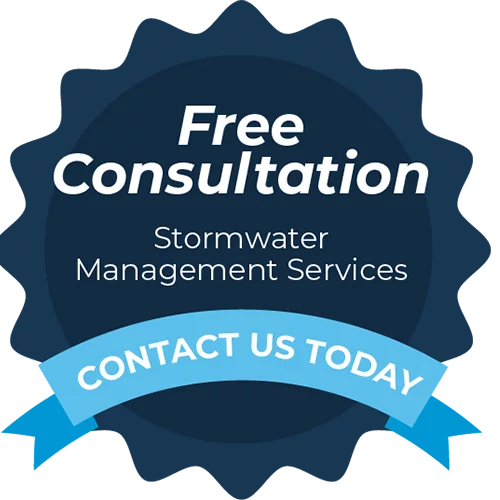As urban development continues to grow across Delaware, stormwater management has become a critical component of property ownership. Whether you’re a commercial property manager, developer, or homeowner, understanding the state’s stormwater requirements is essential to staying compliant, avoiding fines, and protecting local water quality.
This guide breaks down what you need to know about Delaware stormwater regulations, including permitting, maintenance responsibilities, and key considerations for both new and existing properties.

Why Stormwater Management Matters in Delaware
Stormwater runoff occurs when rain or snowmelt flows over impervious surfaces like rooftops, driveways, and parking lots, collecting pollutants before entering waterways. In Delaware – where the entire state drains into the Chesapeake Bay, Delaware River, or Atlantic Coast – this runoff can have a serious impact on water quality, flooding, and ecosystem health.
To protect local water resources, Delaware enforces stormwater regulations under the authority of:
- The Delaware Sediment and Stormwater Program, administered by the Department of Natural Resources and Environmental Control (DNREC)
- Federal Clean Water Act (CWA) provisions, including MS4 (Municipal Separate Storm Sewer System) requirements for urban areas
Key Stormwater Regulations in Delaware
1. Sediment and Stormwater Program Requirements
Delaware’s Sediment and Stormwater Program, established under the Sediment and Stormwater Law (7 Del. C. Chapter 40), applies to most construction activities disturbing 5,000 square feet or more of land. Key requirements include:
- Stormwater Management Plan: Projects must submit an approved plan detailing how runoff will be managed both during and after construction.
- Sediment and Erosion Control: Temporary controls must be installed to prevent sediment from washing into nearby waterways during construction.
- Post-Construction Stormwater Controls: Permanent stormwater practices (like bioretention, infiltration, or detention facilities) must be designed to meet water quality and quantity control standards.
DNREC reviews and approves these plans or delegates review to Certified Construction Reviewers (CCRs) and approved delegated agencies such as counties and conservation districts.
2. MS4 Compliance for Urban Areas
If your property is in an urbanized area subject to MS4 (Municipal Separate Storm Sewer System) regulations – such as New Castle County or certain municipalities – you may face additional compliance obligations:
- Routine inspections and maintenance of on-site stormwater facilities
- Recordkeeping and reporting on stormwater control measures
- Adherence to local stormwater ordinances and BMPs (Best Management Practices)
Do You Need a Stormwater Permit?
You likely need a Construction General Permit (CGP) or Industrial Stormwater Permit if your project involves:
- Land disturbance ≥ 1 acre
- Construction near wetlands or waterbodies
- Activities with potential to discharge pollutants into state waters (e.g., commercial, industrial, or large-scale residential developments)
Even for projects under 1 acre, a permit may still be required if they are part of a larger common plan of development.
DNREC’s eNOI (electronic Notice of Intent) system allows for online filing of stormwater permits.
Responsibilities for Property Owners
Whether your site is newly developed or has existing stormwater infrastructure, here’s what you need to do:
1. Routine Maintenance
Stormwater facilities – like detention ponds, bioswales, or storm drains – must be regularly maintained to function properly and stay compliant. This includes:
- Removing debris, sediment, and vegetation overgrowth
- Ensuring inlets, outlets, and pipes are not blocked or damaged
- Managing mosquito populations and invasive species
2. Inspections
Property owners are often required to conduct and document annual or semi-annual inspections of their stormwater management systems. These inspections help prevent failures and identify necessary repairs early.
3. Recordkeeping
Keep detailed records of all inspections, maintenance activities, and repairs. These may be requested during DNREC or MS4 audits.
Tips for Staying Compliant
- Work with a certified stormwater professional: A licensed engineer or experienced contractor can help you design, inspect, and maintain your system.
- Review local ordinances: Stormwater requirements may vary by county (e.g., New Castle, Kent, or Sussex) or municipality.
- Plan ahead for permitting: Stormwater approval is often one of the first steps needed before building permits are issued.
- Monitor site changes: If you add impervious surfaces or change site grading, you may need to update your stormwater plan.
Penalties for Non-Compliance
Failure to comply with Delaware’s stormwater regulations can result in:
- Stop work orders
- Fines of up to $10,000 per violation per day
- Required corrective actions at the property owner’s expense
Partner With Stormwater Experts in Delaware
At iSTORMWATER, we help property owners across Delaware, Maryland, Virginia, and Washington, DC navigate stormwater regulations with confidence. From stormwater inspections and maintenance to compliance consulting, our experts ensure your property meets all local, state, and federal requirements.
Ready to Make Stormwater Compliance Easier?
📞 Call us at (410) 231-3455 or 💬 Contact us online to schedule a stormwater inspection or consultation in Delaware.
Frequently Asked Questions (FAQ)
Q: Do I need a stormwater plan for a small commercial property?
A: If the project disturbs over 5,000 sq. ft. or is part of a larger development, you likely need a stormwater plan approved by DNREC or a delegated agency.
Q: Who is responsible for maintaining stormwater ponds?
A: Typically, the property owner or Homeowners Association (HOA) is responsible for maintaining stormwater infrastructure, unless a municipality has agreed to take over ownership.
Q: How do I know if my property is in an MS4 area?
A: MS4 areas are designated urban zones with separate storm sewer systems. Check with your local government or DNREC to confirm your property’s status.
Real Results
iStormwater LLC was an excellent choice. They made the process of the Stormwater pond repairs seamless. They took charge of the project and got the project approved and passing the inspection. We highly recommend them and would use them again.
Incredible stormwater management service. The owner John consulted on a property I manage and ended up saving us thousands of dollars in environmental fees from the government. Now, our property is compliant with the EPA and we have a great partner to keep us maintained on stormwater regulations over time.
So helpful with all of my water issues.
Great communication and leadership and a family friendly atmosphere. Thank you John!
As urban development continues to grow across Delaware, stormwater management has become a critical component of property ownership. Whether you’re a commercial property manager, developer,...
- Annapolis
- Anne Arundel County
- Baltimore County
- Baltimore
- Bel Air South
- Bethesda
- Bowie
- Cecil County
- Charles County
- Columbia
- Gaithersburg
- Glen Burnie
- Howard County
- Montgomery County
- Pasadena
- Prince George’s County
- Rockville
- Severna Park
- St. Mary’s County



